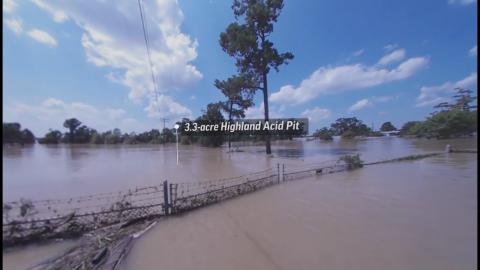Share
EPA Exists to Keep Us Safe - They Failed in Houston

The mission of the Environmental Protection Agency is inherent in it's name -- protect our environment and, in doing so, protect our people. EPA head Scott Pruitt is one of the hardest working politicians in D.C. in 2017, efficiently dismantling the EPA as discussed many times on Smart Dissent. This is an EPA already unable to keep up with the massive needs it ought to be filling due to decades of woeful funding and obstruction by the GOP.
In the real world, this has dire consequences which are apparent in Houston following the historic flooding of Hurricane Harvey. Millions of people are put in grave risk. Does anyone care? OUR EPA sure doesn't.
The Associated Press surveyed seven Superfund sites in and around Houston during the flooding. All had been inundated with water, in some cases many feet deep.... the EPA had not yet been able to physically visit the Houston-area sites, saying the sites had “not been accessible by response personnel.” [However] AP journalists used a boat to document the condition of one flooded Houston-area Superfund site, but accessed others with a vehicle or on foot. The EPA did not respond to questions about why its personnel had not yet been able to do so.
The threats to human health and wildlife from rising waters that inundate Superfund sites vary widely depending on the specific contaminants and the concentrations involved. The EPA report specifically noted the risk that floodwaters might carry away and spread toxic materials over a wider area.
“If floodwaters have spread the chemicals in the waste pits, then dangerous chemicals like dioxin could be spread around the wider Houston area,” said Kara Cook-Schultz, who studies Superfund sites for the advocacy group TexPIRG. “Superfund sites are known to be the most dangerous places in the country, and they should have been properly protected against flooding.”
How real and immediate it this threat?
Independent monitors found benzene levels after Harvey six times higher than guidelines. Bezene is a compound so potent that the American Petroleum Institute, a trade group for the oil and gas industry, acknowledged in 1948 “the only absolutely safe concentration … is zero.”
As a longtime resident of Manchester, Guadalupe Hernandez is used to the chemical smells that waft through his southeast Houston, Texas neighborhood, a low-income, predominantly Hispanic community near a Valero Energy refinery. But when Hurricane Harvey blew in the weekend of Aug. 26, the stench became noticeably stronger for about five hours, a scent like “glue or boiled eggs,” he said.
The two highest benzene concentrations, 90 and 77 ppb, were detected within 1,600 feet of a damaged storage tank at the Valero refinery. At the time the data was collected, the wind was blowing from the direction of the tank toward the monitoring sites. Valero reported on Aug. 27 that the rain from Hurricane Harvey had submerged the tank’s floating roof, releasing benzene and crude oil. The EPA said Thursday that Valero had significantly underestimated the amount of benzene that leaked out, the Houston Chronicle reported.
What will the EPA do to keep us safe? Nothing.
Pruitt has called cleaning up Superfund sites a top priority, even as he has taken steps to roll back or delay rules aimed at preventing air and water pollution. Trump’s proposed 2018 budget seeks to cut money for the Superfund program by 30 percent.
Sources:
https://apnews.com/27796dd13b9549b0ac76aded58a15122
http://projects.propublica.org/graphics/harvey-manchester
